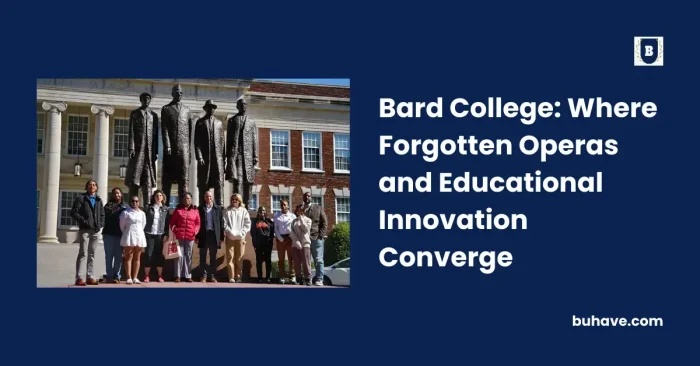In the picturesque Hudson Valley, Bard College has long been synonymous with innovative education and cultural exploration. At the helm of this renaissance is Leon Botstein, whose nearly five-decade tenure as president has transformed the institution into a beacon of liberal arts education and a haven for neglected musical masterpieces.
A Visionary’s Journey
When Botstein assumed the presidency of Bard College in 1975 at the age of 28, he was already the youngest college president in U.S. history. Born in Zurich to Polish Jewish physicians who had fled their homeland, Botstein’s own journey from refugee to educational innovator has profoundly shaped his vision for Bard.
Under Botstein’s leadership, Bard has expanded from a small, regional liberal arts college to a global institution. His innovations have touched every aspect of the college, from curriculum design to community engagement. The creation of the Bard High School Early College program and the Bard Prison Initiative are just two examples of Botstein’s commitment to expanding educational access.
From Classroom to Concert Hall
Botstein’s impact on Bard extends far beyond traditional academics. A trained musician himself, he has made the arts, particularly music, a cornerstone of the Bard experience. In 1990, he established the Bard Music Festival, which has become internationally renowned for its innovative, thematic approach to exploring the works of a single composer each year.
This success led to the development of the Richard B.
Fisher Center for the Performing Arts, a Frank Gehry-designed facility that opened on the Bard campus in 2003. The Fisher Center became home to Bard SummerScape, a festival that expanded the college’s cultural offerings to include opera, dance, theater, and cabaret over six weeks each summer.
Reviving Forgotten Masterpieces
It is within the context of SummerScape that we find some of Botstein’s most ambitious undertakings: the revival of neglected operatic works. This summer, Bard presented two such productions: Giacomo Meyerbeer’s “Le Prophète” and Hector Berlioz’s “La damnation de Faust.”
“There is no composer in the history of classical music and opera whose posthumous career has been so startlingly destroyed as Meyerbeer,” Botstein remarked about the composer of “Le Prophète.” This statement encapsulates his drive to challenge established narratives in classical music and bring unjustly neglected works back into the spotlight.
Botstein’s approach to “Le Prophète” was characteristically thorough. Working with musicologist Mark Everist, he restored an 11-minute overture cut during the original rehearsals, offering audiences a more complete version of Meyerbeer’s vision. The production, featuring Robert Watson as Jean, Jennifer Feinstein as Fidès, and Amina Edris as Berthe, marked the opera’s first major U.S. staging since the Metropolitan Opera’s performances in 1977 and ’79.
A Dramatic Legend Comes to Life
The festival culminated with a performance of Berlioz’s “La damnation de Faust,” a work that defies easy categorization. Berlioz dubbed it a “Dramatic Legend in Four Parts,” blending elements of symphony, opera, and cantata.
The production showcased Berlioz’s innovative approach to music, with Joshua Blue’s affecting Faust, Alfred Walker’s conniving Mephistopheles, and Sasha Cooke’s Marguerite bringing depth to their roles. Cooke’s “radiant mezzo-soprano” was particularly praised, while Stefan Egerstrom made the most of his brief appearance as Brander, “creating a funny and musically beautiful moment” with his tavern song.
The Bard Festival Chorale, under James Bagwell’s direction, demonstrated remarkable versatility, navigating the shifting moods of Berlioz’s score with precision. The American Symphony Orchestra, which Botstein has led as music director since 1992, brought Berlioz’s rich orchestral colors to life.
A Legacy of Innovation
As Bard College continues to evolve under Leon Botstein’s guidance, these operatic productions serve as a reminder of the unique fusion of scholarship, artistry, and innovation that has come to define his tenure. From reimagining liberal arts education to reviving forgotten musical masterpieces, Botstein’s legacy at Bard College is one of tireless dedication to the pursuit of knowledge and the belief in the transformative power of education and the arts.
Looking ahead, Bard’s commitment to operatic exploration shows no signs of waning. Next year’s SummerScape will feature Smetana’s rarely performed “Dalibor,” continuing the festival’s tradition of musical archaeology.
As the strains of Berlioz’s “La damnation de Faust” fade from the Fisher Center, they leave behind not just the memory of a neglected masterpiece brought to life, but a testament to a visionary leader who has spent nearly half a century proving that a true liberal arts education can harmoniously blend the intellectual, the artistic, and the civic. In doing so, Leon Botstein has not only transformed Bard College but has also set a new standard for what higher education and cultural institutions can achieve in the 21st century.

















